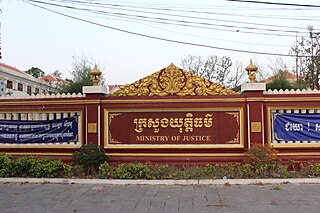Related Research Articles

The Office of the Attorney General of the Republic of the Dominican Republic is a government institution belonging to the executive branch that is responsible for representing the Dominican State in courts of law, defending public interest, assuring respect for the due process of law and overseeing penitentiaries in the Republic.

The Ministry of Justice and Peace of Costa Rica is the ministerial body in charge of administering the country's prisons, assisting the rehabilitation and social reintegration of the prison population, and representing the interests of the State through the General Procurator's Office in Costa Rica.
Established as early as 1826, the Ministry of Human Rights, Justice, Governance and Decentralization of Honduras was created from the territorial division of Honduras and was initially composed of seven departments. The ministry is responsible for matters pertaining to the internal government, which include the following:
The Ministry of Justice and Institutional Transparency of Bolivia is in charge of the justice sector of Bolivia. In addition. the ministry includes the following vice-ministries:
The Ministry of Justice of Benin provides public safety and legal services that "promote the rule of law, ensure the safety and security of the public and uphold the interest of the government and people of the Republic of Benin." According to Article 6 of the Law on the Statute of the Judiciary, the Minister of Justice is the direct superior of the Magistrates of the Public Prosecutor's Office and the Central Administration of the Ministry of Justice. With reference to past records, the minister's title has been Minister of Justice and Legislation and Minister of Justice, Legislative Affairs and Human Rights.
The Ministry of Justice, Human Rights and Civic Promotion, Keeper of the Seals of Burkina Faso is responsible for the following:
The Ministry of Justice of Burundi performs tasks such as the following:
The Ministry of Justice and Human Rights of Chad is structured in the following manner:
The Ministry of Justice, Islamic Affairs, Public Administration and Human Rights handles any legal reforms that might improve the justice system of Comoros. The Union government forces include the Army of National Development and the gendarmerie. When the latter force serves as the judicial police, it reports to the Minister of Justice. Although National Commission for Preventing and Fighting Corruption (CNPLC) exists to prevent corruption, the Ministry of Justice seldom prosecutes corruption cases.

The Ministry of Justice, Worship and Penitentiary Institutions of Equatorial Guinea handles responsibilities such as overseeing the country's bar association, creating judicial rules and procedures, and investigating human rights issues.
The Ministry of Justice of the Republic of the Congo manages the court system and is composed of the following:

The Ministry of Justice and Human Rights of the Democratic Republic of Congo (Congo-Kinshasa) has the following duties:
The Ministry of Justice and Legal Affairs is a ministerial department of the government of Antigua and Barbuda. The Minister of Justice simultaneously serves as the Attorney General.
The Ministry of Justice and Human Rights of Angola is judiciary arm of government that specializes on human rights in the nation of Angola.

The Ministry of Justice provides the administrative framework for the judges and prosecutors such as their professional training and salary and duty allowances. Additionally, with regard to prosecutors, the Minister of Justice is the chief of the prosecution and has the right to issue an injunction (order) to the prosecutions of all level of courts. The General Departments of Prosecutor and Criminal Affairs of the Ministry of Justice is the staff to the Minister of Justice on any related issues.
The Minister of Justice is a part of the Council of Ministers in Cuba, also known as the Cabinet of Cuba. The Ministry of Justice of Cuba is responsible for the following functions:
The Ministry of Justice, Human Rights & Correctional Services of Lesotho aims to dispense and oversee the administration of justice, protection and the promotion of human rights, as well as the rehabilitation of offenders. To fulfill its mandate, the ministry delivers justice and accessibility via the effective uses of correctional resources and the provision of skills. Lastly, the ministry employs a zero tolerance approach to corruption and the vulnerable segments of the population that are subjected to violations of human rights.
The Ministry of Justice of Mauritania is responsible for sector Policy planning, Juvenile justice and Judicial reform, Drafting and distributing legislative texts, and Prison Administration.
The Ministry of Justice of Papua New Guinea and Department of Justice & Attorney General acts as the principal advisor to the government on all legal matters and is responsible for all civil litigation matters by and against the state. The Minister of Justice gives opinions on any questions relating to the interpretation or application of the laws of Papua New Guinea including the Constitution, Organic Laws, Acts of Parliament and all other subordinate legislation. The ministry oversees the following institutions:
The Ministry of Justice, Internal Administration and Human Rights of São Tomé and Príncipe has certain responsibilities such as overseeing the São Tomé and Príncipe land registry, property registry, and prison system.
References
- ↑ "Ministerio de Justicia :: Rol del Ministerio". www.ministeriodejusticia.gov.py (in Spanish). Retrieved 2018-07-18.
- ↑ "Ministerio de Justicia :: Administración de Justicia". www.ministeriodejusticia.gov.py (in Spanish). Retrieved 2018-07-18.
- ↑ "Chiefs of State and Cabinet members of foreign governments / National Foreign Assessment Center. 1994:Jan.-Mar." HathiTrust. Retrieved 2018-07-18.
- ↑ "Chiefs of State and Cabinet members of foreign governments / National Foreign Assessment Center. 1997Jan-Apr 1997". HathiTrust. Retrieved 2018-07-18.
- ↑ "Chiefs of State and Cabinet members of foreign governments / National Foreign Assessment Center. Jan-Apr 1999". HathiTrust. Retrieved 2018-07-18.
- ↑ "Chiefs of State and Cabinet members of foreign governments / National Foreign Assessment Center. Jan-Mar 2000". HathiTrust. Retrieved 2018-07-18.
- ↑ "Ministerio de Justicia :: Autoridades". www.ministeriodejusticia.gov.py (in Spanish). Retrieved 2018-07-18.